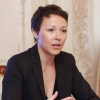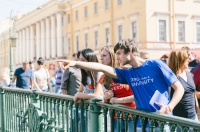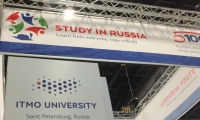The main aim of the visit was to strengthen relationships between the two countries beyond politics and competition. This meeting was a very special one though: there were no official presentations or solemn speeches. The representatives of the House of Commons preferred to focus on talking with the students and getting to know their opinion.
The discussion focused predominantly on how to improve government policies that would lead to closer scientific and educational cooperation. According to the representatives of the House of Commons, the students play a vital role in this, as they can share their international study experience with their friends, classmates, and colleagues.
“At this time, Russian students have few possibilities to study at British universities, because almost none of the universities offer free academic exchange programs. Of course, the students cannot afford tuition fees. I would like to continue the conversation with our British partners on this issue. For instance, grants and scholarships of British universities could enhance collaboration between our countries in this respect,” explained Maria Didkovskaia, Head of Internationalization Department.

Significant financial costs are one of the main factors preventing students from studying abroad, even for one semester exchange, although, in the student’s opinion, such an experience would make them stand out when applying for jobs. Furthermore, it is an excellent opportunity tolearn from successful experiences abroad that could be applied to Russia’s reality.
“Study abroad is a great professional experience: an opportunity to enjoy different educational methods, look at your specialization from a new perspective, improve your communication skills, and try to integrate into a new culture. Still, I am sure that the employer would be more focused on excellent knowledge and actual work experience. Personally, I would like to collaborate with British universities not only in educational, but mostly in practical projects. Joint work implies closer communication and intensive interaction “shoulder to shoulder”. This would be beneficial for both students and future employers,” shares Asia Dubinovskaya, a student of Department of Laser and Light Engineering.

As a matter of fact, the members of the British Parliament discussed also future career perspectives of the students after graduation: which employment spheres they consider as most desirable, where they see themselves in 10 years. It was very interesting to compare the experiences of the two countries.
“The members of the British parliament came to Russia to talk to students – for me this was the first meeting of this kind. It’s hard to imagine how the members of Duma would go to, let’s say, European universities and talk to their students. This is why I hope that this discussion will improve the relationships between Russia and Great Britain, at least in the fields of education and science. Personally I would really like to study in England, and I dream of going there for one or two semesters; actually, my dream is to get a PhD at Oxford University,” says Sergei Belov, a student of Department of Information Security and Computer Technologies.

The meeting with foreign colleagues ended with a discussion of potential collaboration for student exchange, English language learning, and joint scientific projects.





